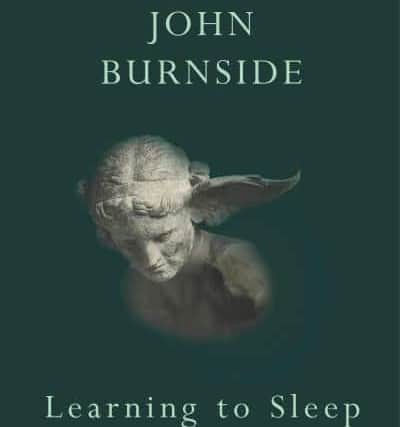Book review: Learning to Sleep, by John Burnside


John Burnside is, to use a good Scots word, a byordinar writer. Whether in memoir, novels or poetry his oeuvre combines the gothic, the cryptic, the mystic and the barbaric. There have been themes across his work – strange disappearances, moments of epiphany – that he has encircled in his own mythology. This new collection of poems is both a continuation and a radical break. The “memes” as it were are still in place, but in this book the language is riddled with religious overtones. It is a book I had to read three times, and even then I do not think I have plumbed its depths. Nevertheless, I was moved, pleasantly bewildered and more than once, dumbstruck.
The title is the collection in miniature. Does anyone ever “learn” to sleep? There might be insomnia and there might be nodding off, but the verb is crucial. It implies a certain degree of work to be able to do or understand something. The word occurs in the second poem “Extinction Sutra / Blind Pig Blues” with the lines “I am learning to mourn / the saints we will never become”. The same poem has the lines “all sanctuary foregone, I go back to the Verb, and nothing else”. Yet the poetry itself is strangely verbless. Burnside tends to use very specific nouns – “a stray wisp of foxglove or daisy / rooted in clinker, / a tine-pail of potash and bone / by the breeze brick wall”. But the verbs, the momentum, is somehow stalled. It is almost meditative.
Advertisement
Hide AdThere is a problem with the smallest word, “I”, in poetry. Some poems are clearly not by an “I” that is John Burnside. Gender alone can determine that. Some are less certain. Who is saying “the snapped ribs / ghosting on a silence I could hear / from sixty yards away, my windows / open to the honeysuckle lanes / of dust and musk / beneath the lightening stars. / Improbable; and yet I must have slept”. I would like to have quoted more of that poem as Burnside has a tendency to make the reader work. Whenever you think there is a hiatus in the thought, the lines unspool relentlessly. It is the poetic equivalent of someone grabbing your collar and saying “I’m not finished yet”. It does slow the reader, and that is a wholly good thing. You trip over his lines, not on his full-stops.


The religious language is something rather different in Burnside’s work, and here it is unavoidable – words like grace, or mercy, or “like a footfall in the Rock / of Ages”, cherubim and seraphim, or the line “No catechism here; / no sunken church; / and yet, it seems / this mystery is ours / as ruins are, a counterpoint to grace”. I do not think that Burnside is ventriloquizing; rather, there is a yearning for a world beyond the world, even when he is adamantine about “things as they are”. “We who believe” he says “in nothing but superstition”.
In “At Lochty Bridge”, the book’s concerns – mortality, the environment, the accumulation of history, both personal and public, coalesce in one of the book’s stand-out poems. The writer sees a “maunder of ghost-eyed / Cheviots, cropping the verge” whose “orthodox faces / strictured and mildly indignant / like latter day-saints / – and maybe they are unsaintlike, / in their way, / as I might be, / if I could shed my doubts, / here, in a place / where anything can seem / a blessing”. I have a minor aversion to lines of poetry that don’t really do anything, but the placing of “a blessing” in solitude is remarkably affecting. There is a seriousness about Burnside’s poetry which is sorely lacking from most contemporary work. He leaves you space to think.
Certain words – such as “ghost” bind the collection together. In “Indelible” Burnside deals with his relationship to “English” or “RP” via “English Speaking Board”. There is “the ghost of a word”, “cracking against my tongue” as he practices. But “For The English Speaking Board, they taught me / not just to speak, but to think in a mother tongue / my mother never knew, a genteel / proxy for our pagan dialect / of locked grimoires / and backstreet skipping rhymes”.
The politics are almost subterranean in Burnside’s work. The missing children and folklore fables are set in a dynamic dialectic of opposition with the more clearly personal poems. Burnside has a marvellous facility to unite his more eldritch and holy concerns. When he writes in Part III of “Indelible”, “and my mother is slicing a heart / at the kitchen table”, reminiscence and metaphor become somehow coagulated. Part of the poem continues “we never eat heart any more, or not / in this house / we never eat liver, or tripe”. Now look carefully. The various meats might catch the eye, but what is the “or” doing there? Are hearts eaten elsewhere? That sliver of ambiguity is what makes Burnside an exceptional writer. Perhaps he should sign off, from the last poem, “Postscript”, “as if a better world was still to come”. Here’s hoping.
Learning To Sleep, by John Burnside, Cape Poetry, £10
A message from the Editor
Thank you for reading this article. We're more reliant on your support than ever as the shift in consumer habits brought about by coronavirus impacts our advertisers.
If you haven't already, please consider supporting our trusted, fact-checked journalism by taking out a digital subscription at https://www.scotsman.com/subscriptions